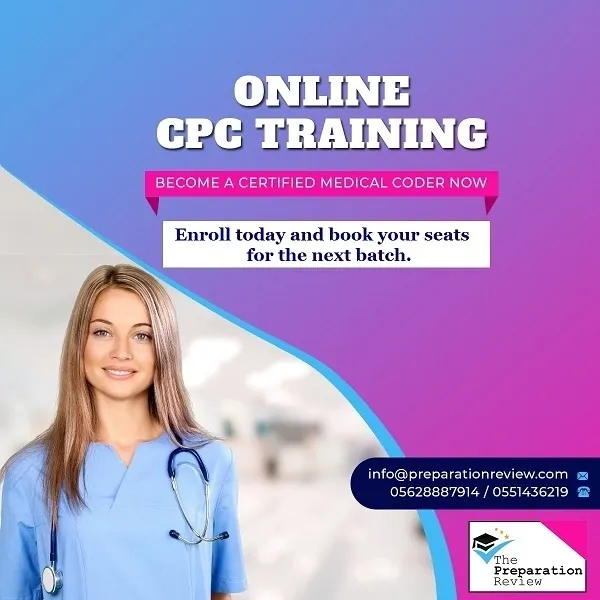The healthcare industry is transforming. Accurate documentation, efficient billing, and data-driven insights have become highly important. The leaders of this evolution are medical coders, who translate complex medical records into standardized codes.
If you're looking for a rewarding career change or want to enhance your healthcare expertise, The Preparation Review's Medical Coding Training Program is your way to success. This course helps students learn and develop the essential qualities and skills required to work as an effective medical coding professional. With expert trainers teaching the best practices in medical coding and practical skills, students get the most out of the course and are ready to score high in the exam.
Enroll in the advanced Certified Professional Coder course in Abu Dhabi and Al Ain. For those in Dubai, online medical coding training is available.

Begin a rewarding career in medical coding by enrolling in The Preparation Review’s medical coding course online in Abu Dhabi, Al Ain, or Dubai. Establish yourself as a vital resource in the medical field with the best certified professional coder course.

Applicants holding a diploma, graduation, postgraduate, or PhD in -
Total duration: Flexible hours for each subject.
Or
Total duration: 80 hours (45 hrs Instruction + 35 hrs Testing).
Class Duration: 3 hours per class.
Online study resources/materials.
Engaging lectures, practical exercises, and case studies
ICD, CPT, and HCPCS coding systems and guidelines
Personalized training choices
Assistance in booking the exams.
Online preparation using Microsoft Teams.
Bachelor of Ayurvedic Medicine and Surgery
Certificate in Obstetrics
MBA in Healthcare Management
Certified Professional Coder (CPC) & Auditor (CPMA)
CPC and CPMA Educator / Trainer

Online CPC Course
The CPC Exam Breakdown Passing the CPC exam requires you to correctly answer a minimum of 70 questions from the series below. The exam questions, however, will not be identified or sorted by the series to which they pertain. The CPC test will rely on a level of understanding that enables you to identify the series.
The 10,000 Series CPT® part of the exam will consists of six questions related to surgical procedures performed on the integumentary system, which includes skin, subcutaneous, and accessory structures, as well as nails, pilonidal cysts, repairs, destruction, and breast.
The six questions in the 20000 Series CPT® will home in on surgical procedures performed on the musculoskeletal system from head to toe. Specifically, these areas include the head, neck, back and flank, spine, abdomen, shoulder, arm, hand and fingers, pelvis and hip, leg, foot and toes.
Six questions covering the 30000 Series CPT® focus on surgical procedures performed on the respiratory system, surgical procedures performed on the cardiovascular system, surgical procedures performed on the hemic and lymphatic systems, and surgical procedures performed on the mediastinum and diaphragm.
Your knowledge of the 40000 Series CPT® will be tested with six questions targeting surgical procedures performed on the digestive system, which will focus on these areas: lips, mouth, palate and uvula, salivary gland and ducts, pharynx, adenoids, and tonsils, esophagus, stomach, intestines, appendix, rectum, anus, liver, biliary tract, pancreas, abdomen, peritoneum, and omentum.
The CPC exam will assess your knowledge of the 50000 Series CPT®with six questions pertaining to surgical procedures performed on the urinary system, surgical procedures performed on the male reproductive system, surgical procedures performed on the female reproductive system, including maternity and delivery, and surgical procedures performed on the endocrine system.
Six questions directed at the 60000 Series® involve surgical procedures performed on the nervous system and will include codes pertaining to the skull, meninges, brain, spine, spinal cord, extracranial nerves, peripheral nerves, autonomic nervous system.
Six E/M questions will assess your coding proficiency related to place and level of services, such as office/other outpatient, hospital observation, hospital inpatient, consultations, emergency department, critical care, nursing facility, domiciliary and rest homes, and home services. It will also include questions directed at preventive medicine, non-face-to-face services, neonatal and pediatric critical care, intensive care, prolonged services, chronic care, transitional care, case management, and care plan oversight.
Four questions related to anaesthesia will pertain to time reporting, qualifying circumstances, physical status modifiers, and anaesthesia for surgical, diagnostic, and obstetric services.
The six questions in this section of the CPC test will focus on both diagnostic and interventional radiology, including diagnostic ultrasound, radiologic guidance, mammography, bone and joint studies, radiation oncology, and nuclear medicine.
Six path/lab questions will determine your knowledge of organ and disease panels, drug testing, therapeutic drug assays, evocation/suppression testing, consultations, urinalysis, molecular pathology, MAAA, chemistry, haematology and coagulation, immunology, transfusions, microbiology, anatomic pathology, cytopathology, cytogenetic studies, surgical pathology, in vivo and reproductive.
Six questions will cover numerous specialty-specific coding scenarios, as well as immunizations, biofeedback, dialysis, central nervous system assessments, health and behavior assessments, hydration, medical nutrition, therapeutic and diagnostic administration, chemotherapy administration, photodynamic therapy, osteopathic manipulative treatment, patient education and training, non-face-to-face non-physician services, and moderate sedation.
Medical terminology for all systems in the human body will be assessed in four questions. Anatomy Anatomy for all systems in the human body will be assessed in four questions.
Five questions will require proficiency in diagnosis for all the chapters included in ICD-10-CM, as well as thorough knowledge of the ICD-10-CM Official Guidelines for Coding and Reporting. Additionally, diagnosis questions will appear in other sections of the exam from the CPT® categories.
Three questions on the CPC exam will pertain to HCPCS Level II coding and include questions focusing on modifiers, supplies, medications, and professional services for Medicare patients.
This section of the CPC test will involve seven questions addressing the ICD-10-CM Official Guidelines for Coding and Reporting, CPT® coding guidelines and parenthetical notes, and modifier use.
Three questions testing your knowledge of compliance and regulations will pertain to services covered under Medicare Parts A, B, C and D; applying coding to payment policy, place of service reporting, fraud and abuse, NCCI edits, NCD/LCD, HIPAA, ABNs, and RVUs.
Ten cases with one multiple choice question per case will test your ability to accurately code medical record documentation using CPT®, ICD-10-CM, and HCPCS Level II. The cases will cover 10000 series, 20000 series, 30000 series, 40000 series, 50000 series, 60000 series, medicine, anaesthesia, radiology, pathology and laboratory, and evaluation and management services. Medical terminology, anatomy, compliance, and regulatory information may also be tested in the cases.
Inquiry Now for Certified Professional Coder Course in Abu Dhabi, Al Ain & Dubai
CPT® are trademarks registered and/or owned by the AMA, which was not involved in the production of, and does not endorse, this site.